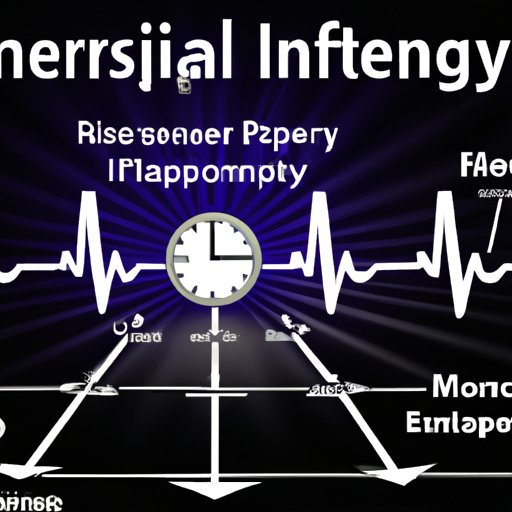Introduction
Sleep is an essential part of our daily lives and it plays a major role in our physical and mental health. A good night’s sleep can help us feel energized and focused during the day, while inadequate or poor-quality sleep can lead to a range of issues including fatigue, mood swings, and difficulty concentrating. Exercise has long been known to have a positive impact on sleep, but how exactly does it work? In this article, we will explore the physiological effects of exercise on sleep, as well as the role of exercise in alleviating insomnia, and the benefits of regular exercise for better sleep.

Exploring the Physiological Effects of Exercise on Sleep
There are several physiological mechanisms that explain how exercise can improve sleep. First, increased alertness during the day can make it easier to fall asleep at night. Exercise releases endorphins which can create a feeling of wellbeing and reduce stress. Additionally, exercise helps regulate core body temperature, which is important for initiating sleep. As we become more active during the day, our body temperature increases and then drops at night, allowing us to fall asleep more easily.
Furthermore, exercise can also lead to decreased levels of stress hormones such as cortisol, which can interfere with sleep if they remain elevated. Elevated cortisol levels have been linked to difficulty falling and staying asleep, as well as shorter sleep duration. By engaging in regular exercise, we can reduce cortisol levels and induce a calmer state before bedtime.
Examining the Role of Exercise in Alleviating Insomnia
Insomnia is a common sleep disorder that affects millions of people worldwide. It is characterized by difficulty falling asleep, staying asleep, and/or early morning awakening. Physical activity has been shown to be an effective treatment for insomnia, particularly when combined with cognitive behavioral therapy (CBT). Studies have found that engaging in moderate to vigorous aerobic activity can help reduce insomnia symptoms such as difficulty sleeping, fatigue, and daytime sleepiness.
The impact of physical activity on insomnia symptoms is thought to be due to its ability to reduce stress and anxiety. Exercise has been found to be particularly helpful in reducing anxiety-related insomnia, which is often caused by rumination or worrying thoughts. Additionally, exercise can help improve sleep quality by increasing slow-wave sleep (SWS), which is the deepest stage of non-REM sleep and is important for physical restoration and memory consolidation.

Investigating the Benefits of Regular Exercise for Better Sleep
Regular exercise can have a number of beneficial effects on sleep. Firstly, it can improve overall sleep quality. Studies have found that engaging in physical activity for at least 150 minutes per week can result in improved sleep quality, reduced sleep disturbances, and increased sleep duration. Additionally, exercise can also help enhance deep sleep, which is the most restorative stage of sleep and is important for physical recovery and memory formation. Finally, regular exercise can also reduce fatigue and help us feel more energized during the day, making it easier to fall asleep at night.

Analyzing Exercise Habits and Sleep Patterns
It is important to understand the relationship between physical activity and sleep in order to maximize the benefits of exercise. The intensity and frequency of exercise can have an impact on sleep quality. For example, high intensity interval training (HIIT) can be beneficial for improving sleep quality, however it should not be done too close to bedtime as it may affect your ability to fall asleep. Additionally, engaging in regular exercise is key for improving sleep quality, so it is important to find an exercise regimen that works for you and stick to it.
Understanding the Impact of Exercise on Sleep Quality
Studies have also looked into the impact of exercise on sleep duration. Research has found that engaging in moderate to vigorous aerobic activity can increase total sleep time and reduce the amount of time it takes to fall asleep. Additionally, physical activity has been found to have a positive effect on restorative sleep, which is important for cognitive functioning and emotional wellbeing.
Conclusion
In conclusion, exercise has many positive effects on sleep, from increased alertness during the day to improved quality of sleep at night. Regular exercise can help reduce stress and anxiety, improve core body temperature regulation, and increase slow-wave sleep. It is important to understand the relationship between physical activity and sleep in order to maximize the benefits of exercise, as well as to understand the role of intensity and frequency of exercise. With this knowledge, individuals can make informed decisions about their exercise habits in order to improve their sleep quality.
In summary, exercising regularly can help you get a better night’s sleep and can even help alleviate insomnia symptoms. If you are having trouble sleeping, consider incorporating some form of physical activity into your daily routine. Be sure to consult with your doctor or healthcare provider to determine the best exercise regimen for your individual needs.
(Note: Is this article not meeting your expectations? Do you have knowledge or insights to share? Unlock new opportunities and expand your reach by joining our authors team. Click Registration to join us and share your expertise with our readers.)
